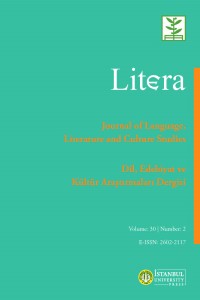Öz
Kaynakça
- Batur, E. (2011). Yolcu. İstanbul: Kırmızı Yayınları.
- Bouvier, N. (2001). L’usage du monde. Paris: Éditions Payot&Rivage.
- Gürsel, N. (2013). Bir avuç dünya. İstanbul: Doğan Kitap.
- Kpomassie, T.-M. (1981). L’Africain du Groenland. Paris: Flammarion.
- Maréchaux, L. (2017). Écrivains voyageurs: Ces vagabonds qui disent le monde. Barselona: Éditions Arthaud.
- Onfray, M. (2016). Théorie du voyage: poétique de la géographie. Sant Andreu de la Barca: Librairie Générale Française.
- Richemont, B. de (2015). Manifeste vagabond. Paris: Presses de la Rennaissance.
- Roy, G. (2012). La Détresse et l’Enchantement. Cap-Saint-Ignace: Boréal.
- Segalen, V. (2018). Essai sur l’exotisme. Paris: Librairie Générale Française.
- Tesson, S. (2017). Éloge de l’énergie vagabonde. Malesherbes: Éditions des Équateurs.
Öz
The French adjective “romanesque”, which derives from the French word for “novel” and which means, in a broader sense, something out of the ordinary or something that derives from dream and imagination can be taken as a principal term to understand the situation of the traveler writer who leaves her/his home to discover beyond the limits of her/his habitual sphere. Travel writing offers, at that point, a notable prospect regarding the reception of the reality when it comes to have an experience in an unknown place with unpredictable conditions. In this sort of writing, the space and the personality take part in an eventual and exclusive relation under the condition of strangeness related to the circumstances of elsewhere and to the changing individual state of the traveler. Thus, an ordinary habitant becomes, first, traveler when s/he leaves the home, then, becomes traveler writer when s/he reports her/his experience, finally, “romanesque traveler” when her/his psychical travel experience gives a wordily result through creating a new world in which the traveler writer takes the role of attentive observer who tends to see in things the unseen, the hidden, the imaginative and the sensational. By referring to the literary works, with the theme “travel”, that have been realized throughout the twentieth and the twenty-first centuries, this paper aims to show a possible conceptual association and a consecutive relation that occur between the titles “traveler writer” and “romanesque traveler” as a phenomenon of travel literature.
Anahtar Kelimeler
Travel literatur comparative literature the twentieth century literature the twenty-first century literature poetics of space
Kaynakça
- Batur, E. (2011). Yolcu. İstanbul: Kırmızı Yayınları.
- Bouvier, N. (2001). L’usage du monde. Paris: Éditions Payot&Rivage.
- Gürsel, N. (2013). Bir avuç dünya. İstanbul: Doğan Kitap.
- Kpomassie, T.-M. (1981). L’Africain du Groenland. Paris: Flammarion.
- Maréchaux, L. (2017). Écrivains voyageurs: Ces vagabonds qui disent le monde. Barselona: Éditions Arthaud.
- Onfray, M. (2016). Théorie du voyage: poétique de la géographie. Sant Andreu de la Barca: Librairie Générale Française.
- Richemont, B. de (2015). Manifeste vagabond. Paris: Presses de la Rennaissance.
- Roy, G. (2012). La Détresse et l’Enchantement. Cap-Saint-Ignace: Boréal.
- Segalen, V. (2018). Essai sur l’exotisme. Paris: Librairie Générale Française.
- Tesson, S. (2017). Éloge de l’énergie vagabonde. Malesherbes: Éditions des Équateurs.
Öz
L’adjectif “romanesque” qui vient du mot “roman” et qui signifie, dans un sens élargi, quelque chose sortant de l’ordinaire, ou quelque chose relevant du rêve et de l’imaginaire peut être pris comme un terme principal pour comprendre la situation du voyageur écrivain qui quitte son chez-soi dans l’intention de découvrir ce qui se situe au-delà des limites de sa sphère habituelle. Le récit de voyage offre, en ce sens, une perspective considérable relativement à la perception de la réalité quand il s’agit d’acquérir une expérience dans un espace inconnu avec des conditions imprévisibles. Dans un tel genre de récit, l’espace et la personnalité font l’objet d’une relation exceptionnelle et éventuelle qui se développe sous une condition d’étrangeté étant liée aux circonstances de l’ailleurs d’une part, et à l’état individuellement changeant du voyageur d’autre part. Ainsi, un habitant ordinaire devient, d’abord, voyageur après avoir quitté son chez-soi, puis, devient voyageur écrivain en conséquence de son acte de rapporter son expérience physique, et finalement, voyageur romanesque, lorsque cette expérience de voyage se traduit en des mots qui font apparaître un nouveau monde dans lequel le voyageur écrivain prend le rôle d’un observateur attentif qui voit dans les choses ce qui n’est pas auparavant vu, ce qui est caché, ce qui porte les traits de l’imaginaire et du sensationnel. En se référant aux ouvrages littéraires comportant le thème de voyage, réalisés au cours des deux derniers siècles, le but sera ici de mettre en évidence, en tant que phénomène de littérature de voyage, la possibilité d’une association conceptuelle et d’une relation conséquente par rapport aux termes “voyageur écrivain” et “voyageur romanesque”.
Anahtar Kelimeler
Littérature de voyage littérature comparée littérature du vingtième siècle littérature du vingt-et-unième siècle poétique de l’espace
Kaynakça
- Batur, E. (2011). Yolcu. İstanbul: Kırmızı Yayınları.
- Bouvier, N. (2001). L’usage du monde. Paris: Éditions Payot&Rivage.
- Gürsel, N. (2013). Bir avuç dünya. İstanbul: Doğan Kitap.
- Kpomassie, T.-M. (1981). L’Africain du Groenland. Paris: Flammarion.
- Maréchaux, L. (2017). Écrivains voyageurs: Ces vagabonds qui disent le monde. Barselona: Éditions Arthaud.
- Onfray, M. (2016). Théorie du voyage: poétique de la géographie. Sant Andreu de la Barca: Librairie Générale Française.
- Richemont, B. de (2015). Manifeste vagabond. Paris: Presses de la Rennaissance.
- Roy, G. (2012). La Détresse et l’Enchantement. Cap-Saint-Ignace: Boréal.
- Segalen, V. (2018). Essai sur l’exotisme. Paris: Librairie Générale Française.
- Tesson, S. (2017). Éloge de l’énergie vagabonde. Malesherbes: Éditions des Équateurs.
Ayrıntılar
| Birincil Dil | Fransızca |
|---|---|
| Konular | Sanat ve Edebiyat |
| Bölüm | Araştırma Makaleleri |
| Yazarlar | |
| Yayımlanma Tarihi | 23 Aralık 2020 |
| Gönderilme Tarihi | 4 Temmuz 2020 |
| Yayımlandığı Sayı | Yıl 2020 Cilt: 30 Sayı: 2 |

